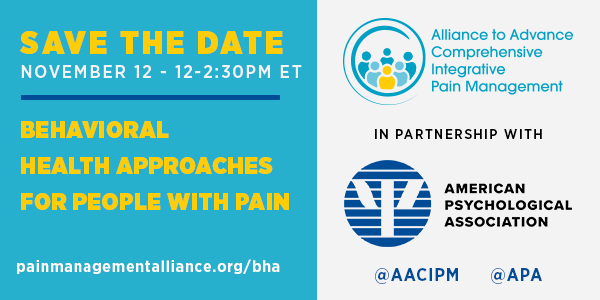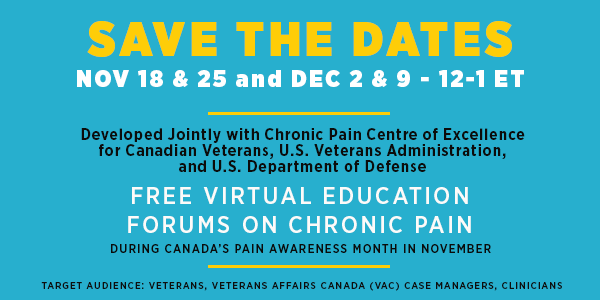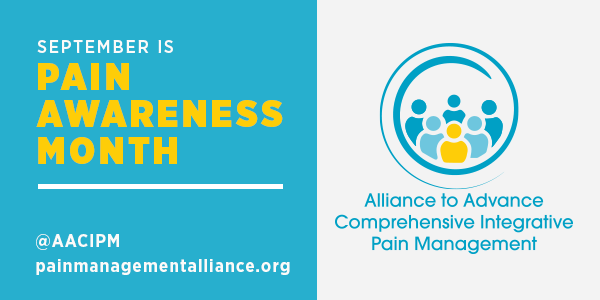Equity in CIPM Access for People with Pain
Symposium Recordings Available
 On September 24, AACIPM hosted a symposium, in partnership with the U.S. Pain Foundation, to share new information and provoke interactive discussion between key leaders addressing equity in access to comprehensive pain management. The recordings of all the presentations can be found at the button below.
On September 24, AACIPM hosted a symposium, in partnership with the U.S. Pain Foundation, to share new information and provoke interactive discussion between key leaders addressing equity in access to comprehensive pain management. The recordings of all the presentations can be found at the button below.
Hear Matt Salo discuss current realities for Medicaid Directors, Nicole Hemmenway share findings from U.S. Pain Foundation’s August 2020 patient survey, David Elton wow us with his analysis of big data from UnitedHealth Group, Shari Ling provide updates from CMS (Medicare), the just-released report from National Governors Association, titled “Expanding Access to Non-Opioid Management of Chronic Pain: Considerations for Governors”, and much more.
Be sure to submit your feedback via the very short post-survey (5-10 minutes) after you’ve watched even just one recording. This is how we gather input for future webinar topics and other details. Also, watch your inbox for announcements on upcoming webinars on topics of interest.
Spotlight: Acupuncture Medicine Cultural Competency
 During the second panel in the September Equity Symposium, we heard from leaders talking about the practical issues related to access and utilization of acupuncture and other integrative therapies for people who are underserved. To keep the conversation moving forward and bring to light how we can tangibly address equity disparities in our own domains, AACIPM has invited this spotlight (below) to share what some acupuncture leaders are doing. Please let us know if you have relevant activities or stories to share from your organization.
During the second panel in the September Equity Symposium, we heard from leaders talking about the practical issues related to access and utilization of acupuncture and other integrative therapies for people who are underserved. To keep the conversation moving forward and bring to light how we can tangibly address equity disparities in our own domains, AACIPM has invited this spotlight (below) to share what some acupuncture leaders are doing. Please let us know if you have relevant activities or stories to share from your organization.
The NCCAOM and ASA Acupuncture Medicine Cultural Competency Task Force (AMCCTF), co-chaired by Afua Bromley, MSOM, LicAc, Dipl Ac (NCCAOM), NCCAOM immediate past chair and LiMing Tseng, MAcOM, LicAc, Dipl OM (NCCAOM), ASA Board Member at Large, was formed to help guide acupuncture medicine stakeholders (institutions, teachers, practitioners, students, vendors, and other stakeholders) to identify and address racism, discrimination, and biases in our profession, so that we may be more effective practitioners, more respectful peers, more inclusive institutions, and more enlightened students.
The Perspective from People Living with Pain
 At the core of AACIPM’s mission is to promote person-centered pain management while including people with pain as engaged, key stakeholders in this work. This means that someone living with pain is involved in all our workgroups and activities in order to ensure that the care we are promoting is not “to” them but “with” them as it should be. As an example, during our September symposium, we heard from Nicole Hemmenway, CEO, and Cindy Steinberg, National Policy and Advocacy Director (both from U.S. Pain Foundation), and Maggie Buckley from The Pain Community and Ehlers-Danlos Society.
At the core of AACIPM’s mission is to promote person-centered pain management while including people with pain as engaged, key stakeholders in this work. This means that someone living with pain is involved in all our workgroups and activities in order to ensure that the care we are promoting is not “to” them but “with” them as it should be. As an example, during our September symposium, we heard from Nicole Hemmenway, CEO, and Cindy Steinberg, National Policy and Advocacy Director (both from U.S. Pain Foundation), and Maggie Buckley from The Pain Community and Ehlers-Danlos Society.
 You won’t want to miss AACIPM’s new resources repository for people with pain (click button below) and the important findings and takeaways Nicole shared from U.S. Pain Foundation’s August 2020 patient survey, “Understanding Barriers to Multidisciplinary Pain Care”, that compiled feedback from almost 1600 individual respondents living with pain (click below).
You won’t want to miss AACIPM’s new resources repository for people with pain (click button below) and the important findings and takeaways Nicole shared from U.S. Pain Foundation’s August 2020 patient survey, “Understanding Barriers to Multidisciplinary Pain Care”, that compiled feedback from almost 1600 individual respondents living with pain (click below).
Free Virtual Education Coming This Fall


Announcements
Proposed Rule – Section 2002 – Public Comment Open thru October 5
This proposal is included in the Notice of Proposed Rulemaking for the 2021 Medicare Physician Fee Schedule, which is open for public comment until October 5; pain stakeholders may want to weigh in.
 RFI – Section 2003 – Public Comment Open thru October 5
RFI – Section 2003 – Public Comment Open thru October 5
CMS has issued a Request for Information (RFI) on section 2003 to seek broad stakeholder feedback on implementing the prescription drug program, including on circumstances and processes to waive the secure transmission requirement, with several specific cases for consideration listed in statute, and enforcement and penalty requirements for future rulemaking.
MHA Report on Chronic Pain and Mental Health Released
 Mental Health America (MHA) released a new report, Early, Equitable and Trauma Responsive Care for Chronic Pain and Mental Health, that explores the connection between arthritis, chronic pain and often untreated mental health conditions, the communities most affected by both conditions, and the barriers to care that they face.
Mental Health America (MHA) released a new report, Early, Equitable and Trauma Responsive Care for Chronic Pain and Mental Health, that explores the connection between arthritis, chronic pain and often untreated mental health conditions, the communities most affected by both conditions, and the barriers to care that they face.
2020 The Art and Science of Pain Management: A Clinical and Research Update – October 3 — Virtual Meeting
This conference will review the latest technology, science and treatment options anyone interested in treating or researching pain should be made aware of in order to offer the best care choices to their patients and background for their studies.

 There have been many activities during Pain Awareness Month! On the last day, below are resources from the NCCIH created for this month, in case you missed them:
There have been many activities during Pain Awareness Month! On the last day, below are resources from the NCCIH created for this month, in case you missed them:
- Pain eBook – overview of what the science says about the effectiveness and safety of complementary health approaches for various pain conditions.
- Low-Back Pain Fact Sheet – learn about mind and body approaches that may be helpful for low-back pain.
- Video From NCCIH Director – in this brief video, Dr. Helene Langevin talks about ongoing research on nonpharmacologic treatments for chronic pain and opioid use disorder.
Message from the Director
 As Pain Awareness Month draws to a close, we hope you have become aware of new resources that will bolster your ability to advance person-centered, evidence-based pain management. You can find information in our fall symposia and growing repository of resources. And I am excited to share that AACIPIM’s Benefit Design Workgroup has been meeting since July and we’ll have exciting updates to share in the near future. This workgroup is an example of bringing together informed experts and leaders from across the stakeholder areas (like you saw in our symposia) to create practical resources for purchasers of healthcare who want to understand where the rubber meets the road.
As Pain Awareness Month draws to a close, we hope you have become aware of new resources that will bolster your ability to advance person-centered, evidence-based pain management. You can find information in our fall symposia and growing repository of resources. And I am excited to share that AACIPIM’s Benefit Design Workgroup has been meeting since July and we’ll have exciting updates to share in the near future. This workgroup is an example of bringing together informed experts and leaders from across the stakeholder areas (like you saw in our symposia) to create practical resources for purchasers of healthcare who want to understand where the rubber meets the road.
Onward and Upward!
Amy
Relevant Reading
![]() Controlled Trial Shows Turmeric Effective in Alleviating Pain of Knee OA, Pain Medicine News, September 28
Controlled Trial Shows Turmeric Effective in Alleviating Pain of Knee OA, Pain Medicine News, September 28
Podcast: Psychology for Chronic Pain: Does it Help? With Dr. Amanda C de C Williams, Integrative Pain Science Institute, September 25
A Primer for Yoga Awareness Month, Fibromyalgia News Today, September 23
After 40 Years, Updated Pain Definition Aims To Include Those Once Left Out, Forbes, September 23
Why Women Experience More Chronic Pain Than Men, Psychology Today, September 22
When Will We Take Women’s Pain Seriously?, Glamour, September 18
Medical Mindfulness: Virtual Reality Mindfulness Therapy for Anxiety and Pain Management in Patients With Acute and Chronic Pain, AAPM, September 17
Comparison of Patient-Reported Outcomes Measurement Information System and Legacy Instruments in Multiple Domains Among Older Veterans With Chronic Back Pain, AAPM, September 17
Researchers Develop New Metrics for Measuring Mental States During Meditation, NIH, September 16
CareFirst BlueCross BlueShield and MedStar Health Sign Landmark Value-Based Care Partnership to Help Transform Health care, MedStar Health, September 16
New Guidelines Issued on Medical Cannabis for Chronic Pain, MedPage Today, September 13
AMTA is Leading the Conversation on Massage Therapy and Pain Relief, AMTA, September 11
Treatment of Chronic Pain, SUD Requires Balance, Psychiatry & Behavioral Health Learning Network, September 11
Embracing the ACT Model for Pain: A Guide for Professionals, Integrative Pain Science Institute, September 4
Massage Therapy Without the Touch, NY Times, August 27
How Acupuncture Can Help With Pain During the Pandemic, Next Avenue, August 27
VA nurses empower Veterans with yoga and guided meditation, U.S. Department of Veterans Affairs, August 26
Feedback
We welcome your input! What do you like? Do you have a contribution for an upcoming newsletter? Send us your comments, suggestions, or contributions.